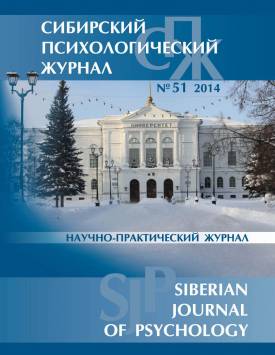Self-defeating humor in russia and humor styles of muscovites
Humor psychology used to study mostly positive influence of humor on a person. Although some empirical data gives evidences against the too positive regard on humor. The necessity arose to distinguish different kinds or styles of humor according to their adaptiveness or social profit. The Humor Styles Questionnaire of R. Martin et al. is one of the first one elaborated within this approach. It includes scales corresponding to the four humor styles: affiliative, self-enhancing, aggressive and self-defeating. The goal of the study is to examine the differences of «positive» and «negative» humor styles interactions in different student samples: Muscovite, Russian-regional and Canadian. Method. The Humor Styles Questionnaire of R. Martin. Subjects. Students of different institutions and faculties: 217 from Moscow and 387 from different towns of Russia. Results. The differences between Muscovite and regional subsamples were revealed. For instance, self-defeating and self-enhancing humor styles are highly correlated in regions and are not connected at all in Muscovites. In comparison with the original Canadian data, in the Russian sample "positive" humor has lower and "negative" -higher means. Moreover, the results showed significant correlations between them: self-defeating humor highly correlates with affiliative and also with self-enhancing in the regional subsample. Humor styles norms in Russia were counted in the representative sample of students. Gender differences were showed. For instance, young men in both of the subsamples had higher aggressive humor style than girls. In the Muscovite sample they also had higher affiliative while in the regional sample - self-enhancing humor style. Discussion. The results differ from the original Canadian data in many respects. The data on Muscovites appeared to be much closer to the Canadian than the regional data, and are characterized by higher differentiation of humor styles. The results on gender differences mostly confirms the original data, although, in the Russian sample the differences on the "positive" styles are more expressed whereas they become smooth on self-defeating humor. Also unlike the original data, gender differences were revealed in the humor styles intercorrelations. Russian data partly contradicts the methodology of the original Canadian study according to which adaptive and maladaptive humor styles are relatively independent. In general, despite the four-factor structure of the questionnaire was reproduced, "positive" and "negative" humor styles appeared to be connected pretty much. Apparently, self-defeating humor is not perceived so unambiguously negatively in Russia as it is in the western culture, and it has cultural-historical explanation.
Keywords
юмор, стили юмора, кросскультурные различия, сравнительный анализ, москвичи и россияне, humor, humor styles, cross-cultural differences, comparative analysis, Muscovites and RussiansAuthors
| Name | Organization | |
| Ivanova Alyona M. | Mental Health Research Center of the Russian Academy of Medical Sciences (Moscow) | ivalenka13@gmail.com |
| Mitina Olga V. | Lomonosov Moscow State University | omitina@inbox.ru |
| Stefanenko Ekaterina A. | Mental Health Research Center of the Russian Academy of Medical Sciences (Moscow) | matja@yandex.ua |
| Enikolopov Sergey N. | Mental Health Research Center of the Russian Academy of Medical Sciences (Moscow) | enikolopov@mail.ru |
| Babina Julia N. | Diagnostics and Consulting Center (Kungur) | Yula1@yandex.ru |
| Zizganova Galina A. | All-Russia Children Center "Orlenok" (Krasnodar) | cccp9092@yandex.ru |
| Nizovskikh Nina A. | Vyatka State Humanities University (Kirov) | ninar05@mail.ru |
References

Self-defeating humor in russia and humor styles of muscovites | Sibirskiy Psikhologicheskiy Zhurnal – Siberian Journal of Psychology. 2014. № 51.
